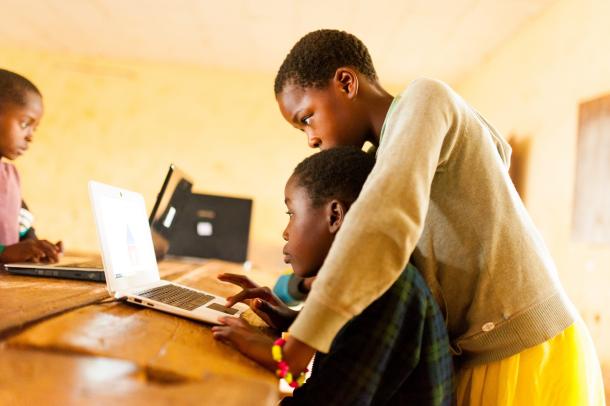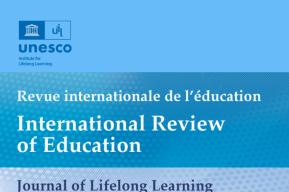News
ICT Transforming Education in Africa: UNESCO and beneficiary countries review achievements and plan for the future

As the KFIT Project “ICT Transforming Education in Africa” enters its final phase of implementation, UNESCO organized a Forum on quality public digital learning and a cross-country seminar in Dakar, Senegal from 22 to 24 November 2022. This event was an important occasion for the KFIT project to look back collectively at its achievements and lessons learnt, and to plan for future activities with renewed momentum, moved by the ambitious - and yet attainable – objective to accompany the digital transformation of education in Africa.
The event gathered approximately 100 participants in person and online, including high level government representatives, international experts and specialists from UNESCO and other UN agencies. It was also an opportunity for the representatives of the project beneficiary countries – Côte d’Ivoire, Ghana and Senegal – to meet in person for the first time since the outbreak of the pandemic, and share experiences and lessons learnt on digital learning. The hybrid format of the Forum allowed for international experts and representatives of champion countries in the field of digital learning to join remotely and enrich the discussions.
During the opening session, the UNESCO Assistant Director-General for Education, Ms Stefania Giannini, reminded participants that 2022 was the year of the Transforming Education Summit, a milestone event that put education at the top of the international agenda and, in her words, “recognized the crucial importance of digital learning and transformation”, notably through the Call to Action on Assuring and improving quality public digital learning for all.
The Minister of Education of Senegal, H.E. Mr Cheick Oumar Anne, echoed her words and highlighted how existing technologies must be leveraged to improve education, teaching and learning. He explained that the expansion of digital learning is a priority in Senegal alongside the support for teachers to integrate digital content in their practices. Both the Minister of Education of Senegal and H.E. Mr Yaw Osei Adutwum, the Minister of Education of Ghana, remarked how the KFIT project has supported their countries along the three pillars of digital learning identified by the Call to Action on public digital learning: digital competencies of teachers and students, digital content and digital platforms, and connectivity.
The Forum allowed participants to learn about the process that led to the Call to Action, and specifically to familiarize themselves with key references including, among others, the report from the International Commission on the Futures of Education Reimagining our future together: A new social contract for education, the TES discussion paper Digital learning and transformation, the UNESCO publication Guidelines for ICT in education policies and masterplans, etc. Representatives from UNESCO and other UN agencies, including IIEP, IICBA and UNICEF, also weighed in and shared examples of their strategies and programmes to facilitate the digital transformation of education.
Taking stock of achievements
As the host of the event, the representatives from the Ministry of Education of Senegal organized a field visit to the National Education Management Information System (SIMEN), the ICT agency of the Ministry of National Education. They provided an overview of the package of 35 SIMEN applications for financial, infrastructure, human resources, education and pedagogical management, inspiring their colleagues from Côte d’Ivoire and Ghana to replicate such systems in their countries.
During the Forum and the cross-country seminar, the discussions were articulated around three main themes, in line with the Call to Action: 1) Policies on digital learning and digital transformation; 2) Building national public digital platforms and content; and 3) Enhancing digital competencies to assure and improve quality of digital learning. Representatives from the country teams of Côte d’Ivoire, Ghana and Senegal proudly shared the achievements resulting from the implementation of the project until now.
Following the event, it emerged that the impact and results of the project are clearly visible. Senegal, for instance, recently launched the self-assessment platform SENlycee2Sciences, with over 2,300 quizzes and 25 remediation modules for mathematics, physics and chemistry, and biology, and trained about 2,000 teachers on the use of digital tools and platforms adopted or endorsed by the Ministry of Education. Ghana shared how the project has supported a number of actions to enhance teachers’ digital skills, including through an Emergency remote teaching training programme and the development of a national ICT Competency Framework for Teachers. Côte d’Ivoire, finally, has developed a new ICT in education policy document, which addressed the digitization of education priority identified through the Estates General of education, as well as a national ICT competency framework for teachers and a model for integrating technology in education.
As the project enters the final stages of implementation of its second phase, the representatives of the national country teams engaged in discussions to ensure that the rest of the planned activities are carried out efficiently and effectively, ensuing the sustainability of actions beyond the duration of this phase of the project. In the near future, UNESCO expects to launch a third phase of the initiative, thus continuing its support of African countries to build crisis-resilient and technology-enabled learning systems.
Resources
- Forum on quality public digital learning and cross-country seminar of the UNESCO-KFIT Project “ICT Transforming Education in Africa” – event page
- UNESCO Korea Funds-in-Trust (KFIT) project “ICT Transforming Education in Africa
- How a UNESCO ICT training is making a difference for a high school teacher in Ghana
- UNESCO and Republic of Korea supporting African countries to build technology-enabled resilient learning systems
- UNESCO’s work in digital learning and transformation of education







